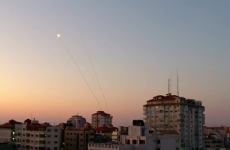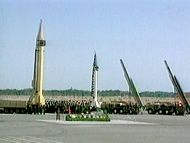
“He was human ticking time bomb” – that’s how Israel’s Shabak security service described Baha Abu al-Ata, Iran’s proxy Gaza. Ata, age-44, was the commander of the Islamic Jihad – the most vicious Palestinian terror organization, and he was about to launch a new wave of terrorism again Israel. For years, Israel’s secret service had been tracking the elusive Ata, but he was always one step ahead. For example, never sleeping in the same bed for two consecutive nights. No doubt about it, Ata was aware that he was at the top of Israel’s hit list. And then, finally, a beak through – Shabak and the IDF concluded that Ata would be sleeping at one of his known hideouts on a specific night, they immediately informed the Prime Minister, and Bibi gave the green light.
On the night of November 13th, Israeli jets launched GPS missiles which demolished Ata’s hideout. He never knew what hit him. It reminded me of the recent American assassination of Islamic State leader, Abu Bakr al-Baghdadi. In Ata’s case, he bore responsibility for terrorizing Israeli civilians day and night. Now, in the nick of time, before he launched another series of suicide bombers, or whatever, he was prevented from doing so.
The Israeli decision took into account that Ata’s enraged cohorts would go on the rampage. Within hours, Islamic Jihadists launched salvos of rockets from Gaza at Israeli towns and villages just across the border. Israeli jets, ready and waiting, immediately took off to seek and destroy these rocket squads. However, their orders were not to hit targets of Hamas, which rules the roost in Gaza and his engaged in a power struggle with Islamic Jihad that is an outright proxy of Iran (similar to Hezbollah in Lebanon).
Bibi called it right. Hamas remained out of the ensuing two-day flare-up. It’s also possible that Hamas enjoyed watching its Islamic Jihad rivals being clobbered by Israel. After Egypt mediated a ceasefire two days later, Islamic Jihad had launched 450 rockets into Israel. However, Israel’s Iron Dome missile defense system shot down 90% of those that were on target for Israeli population centers.
After the flare-up died down, it was apparent that Israeli airpower had pulverized the Islamic Jihad’s infrastructure: rocket arsenals, rocket production facilities, training bases, and headquarters, etc. The IDF inflicted a severe blow; an estimated 20 Jihadists were killed and another 14 Palestinian civilians in collateral damage. Meanwhile, Israeli children, women, and men had to suffer the fear of the wailing air raid sirens day and night, the boom or rockets falling in their vicinity. But all this from inside the safety of their bomb shelters, built inside their very homes. If they are outside these shelters, they have all of 15 seconds to get there.
After two days, Egyptian negotiators persuaded the two sides to accept a ceasefire. It was agreed to take effect at 5:30 AM on Thursday. At that time, the rocket barrage stopped, and Israeli jets halted their airstrikes. However, some five hours later, when some Israeli kids were told to go back to school, Islamic Jihad launched a barrage of rockets. Naturally, the children and their parents were panic-stricken and raced for cover. In retrospect, this was an unusual Israeli civil defense snafu. It appears that civic officials in one particular region were convinced that Islamic Jihad had taken such a pounding that they would be happy to observe the ceasefire. Alas, this was not the case, and some of the terrorists wanted to have the last word.
Some hasty conclusions: The assassination of a Muslim terrorist leader has an impact on his organization, the question is, for how long? Although the organization, in this case, Islamic Jihad, suffered a severe setback, there will always be someone else ready to step up and take charge. However, this leads to a leadership vacuum for some time, and Ata’s replacement will not be as “successful” as his predecessor. As for Israel, the public and, naturally, those Israeli civilians who have long been pressing the Israeli government to take serious action against the terrorists, are hoping for the best.
Impact on Israel’s governmental crisis
The sudden conflagration came against the backdrop of forming a new coalition government, Acting PM Benjamin Netanyahu failed his first chance around, and now Blue and White’s Benny Gantz is not doing any better, as his time limit to form a new coalition is running out fast. As acting PM, Bibi’s handling of the flare-up lent him the opportunity to show his experience in coping with a severe security problem. It could not have come at a better time for Netanyahu. That is not to infer that he deliberately exploited intelligence information about Islamic Jihad – both Shabak and the IDF categorically denied this being the case. They had simply recommended that Israel should eliminate Ata before he launched a new terror campaign.
In another surprising development, Netanyahu received a boost from none other than a highly-respected retired president of Israel’s Supreme Court – Justice Aharon Barak. In a public address, Barak may have shaken up the current political stalemate over whether Bibi can carry on as Prime Minister if the Attorney General indicts him for fraud and breach of trust. In Barak’s view, such a decision should not be taken solely by the Attorney General, but by a court of law. This is important because Bibi’s opponents had been contending that Netanyahu cannot continue serving as Prime Minister once he is indicted by the Attorney General. This lends support to Bibi’s claim that he can carry on as PM, even if he is indicted. This is the crux of the problem that has rocked the formation of a national unity government between Likud and Blue and White. A final question – does the fact that Hamas refused to join Islamic Jihad in the rocketing of Israel indicate that there may be an opening for negotiations between Hamas and Israel?




